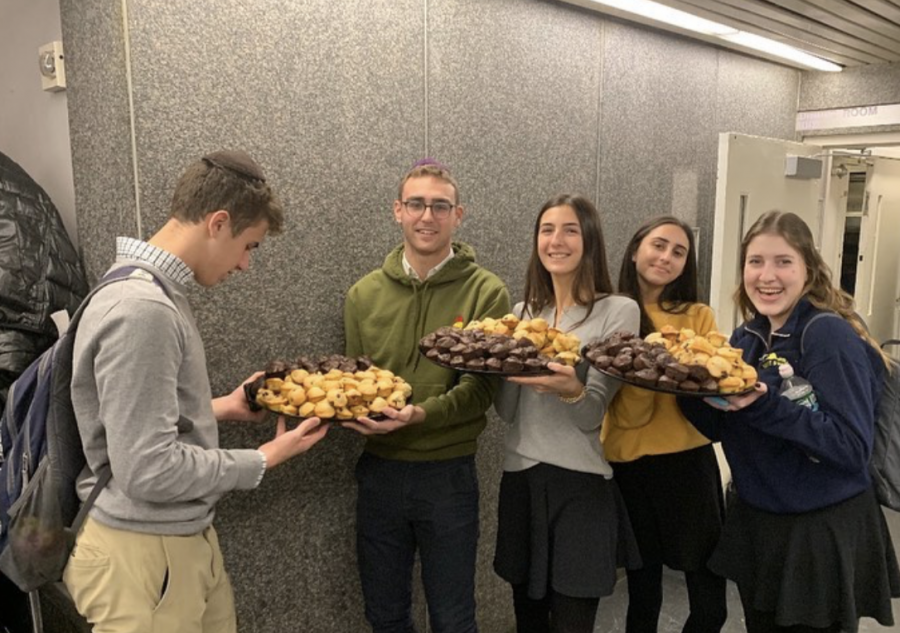Does any real change arrive from monthly SFAC meetings?
Our Student Government Organization board this year, composed of the student President, Caitlin Levine, the Vice President, Caleb Rosenfeld, the Associate Vice President of Communications, Rachel Freilich, the Associate Vice President of Operations, Gabby Ostad, the Associate Vice President of Student Life, Izzie Ottensoser, and class presidents have worked extra hard to bring our school back to “normal” this year.
Along with the student government, SFAC, the Student-Faculty Administration Committee meets about every six weeks to discuss countless ideas for improving the school. This meeting consists of the GO, class presidents, representatives for teachers, and representatives for the administration. They discuss ideas brought in by members and figure out different ways they can make things happen.
Andrew Spielfogel ‘23 is co-Sophomore President with Talia Leifer and has been on the GO board for two years now. He was Freshman Class President last year and also attended SFAC meetings as the advocate for the Freshmen students. He hasn’t presented any topics, but he’s been on follow up committees that speak for a limited amount of time on topics that were discussed more in-depth during the meeting before. He has worked with both Dr. Block and Ms. Cohen on expanding their topics to understand their problems and possibly find solutions. He presented with Dr. Block on the concept of citizenship reports, and whether or not students should be rewarded as well as punished. This topic never actually ended up being brought in for a follow up because Dr. Block didn’t make it to the second meeting to follow up on her thoughts. This topic wasn’t discussed again after moving to zoom. Andrew thinks this could have had potential and that it was unfortunate that the topic ended up bening forgotten about. He also explained that this topic may have been forgotten about because some SFAC meetings prioritize some issues over others and this may not have been perceived to be as important. He thinks that now that the committee is more used to the Zoom environment, they should bring up this topic again because he thinks it would be good for the students. He presented with Ms. Cohen about sports teams this year, and what they can do to increase sports in the school. They are still working on this topic and increasing sports in school, and people are paying more attention to it because it is more of a “pressing” matter.
Andrew explained that SFAC meetings have the potential to be more productive and pass more ideas to the next level. He says that during SFAC meetings they don’t instate new policies, rather they establish understandings. Since last year was moved onto zoom abruptly, he understands that not everything had solutions but he’s hoping that this year there will be more changes. He’s also realized that there have been more changes towards spirit related activities rather than improvements in policies, which he’d also like to see. Andrew definitely believes that SFAC has accomplished its goal of bettering student life by increasing school spirit and reinstating Monday Mincha Muffins. He also thinks that SFAC had a big part in contributing to the excitement surrounding the basketball trip to LA. SFAC helped students get out of class to watch the basketball game in the lounge which he thinks helped a lot with the student experience.
Caleb Rosenfeld ‘22 is the Vice President of the school and was Class President last year for the Sophomore class. Caleb has presented topics about the rules of the gym, enhancing Freshman Orientation, and the test calendar multiple times. He has worked with Ms. Senders, Rabbi Dov, Ms. Krupka, and Rabbi Blaustein. He knows that SFAC has definitely made changes with the test calendar, and possibly with freshman orientation as well. He agrees with Andrew in that a lot of ideas were upended from the start of the pandemic and there was a lot of confusion and uncertainty about the future. He also agrees with Andrew in that SFAC has accomplished its goal of bettering student life, but meetings could be more productive, considering that a lot of the conversation isn’t discussing solutions or improvements, rather just agreeing with the idea that was brought up and repeating reasons to fix the problem.
Overall, the students part of the GO board all prioritize bettering the student experience through teaming up with the teachers and administrators, but different ideas are more often carried through in other environments such as through grade deans or through the Executive GO board rather than a meeting with students, teachers, and administrators, since it is more intimate and more focused on specific advancements.



